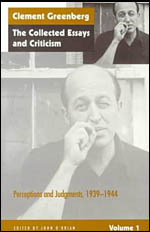Clement Greenberg Avant Garde And Kitsch 1939 Pdf
Art 1001 - Ch. 22 study guide by sherbie25 includes 79 questions covering vocabulary, terms and more. Clement Greenberg was all important in promoting AbEx. Clement Greenberg. Influential essay 'Avant-Garde and Kitsch' (1939) Idea of abstraction linked to the idea of (American) freedom. Clement Greenberg ___ (figurative art) is linked to.
Contents • • • • • • • • • • Early life [ ] Clement Greenberg was born in the borough of the Bronx, NYC, in 1909. Torrent lia model new. His parents were middle-class immigrants, and he was the eldest of their three sons. Since childhood, Greenberg sketched compulsively, until becoming a young adult, when he began to focus on literature. Greenberg attended, the Marquand School for Boys, then, graduating with an in 1930, cum laude,. After college, already as fluent in Yiddish as English since childhood, Greenberg Italian and German in addition to French and Latin. During the next few years, Greenberg travelled the U.S. Working for his father's dry-goods business, but the work did not suit his inclinations, so he turned to working as a.

Greenberg married in 1934, had a son the next year, and was divorced the year after that. In 1936, Greenberg took a series of jobs with the federal government, from Civil Service Administration, to the Veterans' Administration, and finally to the Appraisers' Division of the Customs Service in 1937. It was then that Greenberg began to write seriously, and soon after began getting published in a handful of small magazines and literary journals. Avant Garde and Kitsch [ ] Though his first published essays dealt mainly with literature and theatre, art still held a powerful attraction for Greenberg, so in 1939, he made a sudden name as a visual art writer with possibly his most well-known and oft-quoted essay, ', first published in the journal.
In this Marxist-influenced essay, Greenberg claimed that true art is a product of the Enlightenment's revolution of critical thinking, and as such resists and recoils from the degradation of culture in both mainstream capitalist and communist society, while acknowledging the paradox that, at the same time, the artist, dependent on the market or the state, remains inexorably attached 'by an umbilical cord of gold'. Kitsch, on the other hand, was the product of industrialization and the urbanization of the working class, a filler made for the consumption of the working class: a populace hungry for culture, but without the resources and education to enjoy cutting edge avant garde culture. Greenberg writes, Kitsch, using for raw material the debased and academicized simulacra of genuine culture, welcomes and cultivates this insensibility. It is the source of its profits. Kitsch is mechanical and operates by formulas.

Kitsch is vicarious experience and faked sensations. Kitsch changes according to style, but remains always the same. Kitsch is the epitome of all that is spurious in the life of our times. Kitsch pretends to demand nothing of its customers except their money – not even their time.' For Greenberg, avant garde art was too 'innocent' to be effectively used as propaganda or bent to a cause, while kitsch was ideal for stirring up false sentiment.
Greenberg appropriated the German word ' to describe this low, concocted form of 'culture', though its have since been recast to a more affirmative acceptance of nostalgic materials of capitalist/communist culture. Art history, Abstract Expressionism and after [ ] Greenberg wrote several seminal essays that defined his views on art history in the 20th century. In 1940, Greenberg joined Partisan Review as an editor. He became art critic for the Nation in 1942. He was associate editor of Commentary from 1945 until 1957.
In December 1950, he joined the government funded. Greenberg believed Modernism provided a critical commentary on experience. It was constantly changing to adapt to kitsch pseudo-culture, which was itself always developing. In the years after, Greenberg pushed the position that the best avant-garde artists were emerging in America rather than Europe. Particularly, he championed Jackson Pollock as the greatest painter of his generation, commemorating the artist's 'all-over' gestural canvases. In the 1955 essay 'American-Type Painting' Greenberg promoted the work of Abstract Expressionists, among them,,,, and, as the next stage in Modernist art, arguing that these painters were moving towards greater emphasis on the ' of the picture plane. Greenberg helped to articulate a concept of.